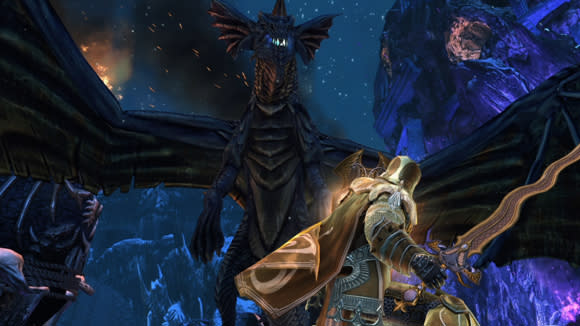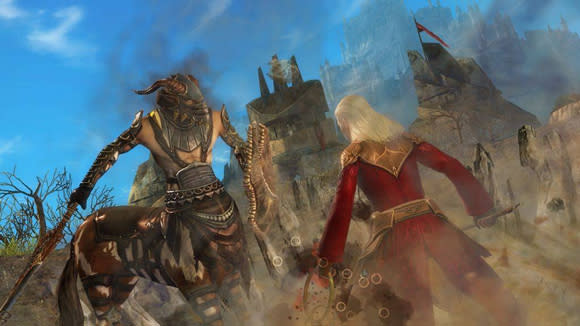The Soapbox: Developers build MMOs backward
How many of you MMOs players have ever maxed out a character's combat level then stood around wondering, "What do I do now?" I would venture to guess that a vast majority of you at one time or another have done that, and I'd also guess that it's been recently. That's because developers have built your game backward. Far too many MMOs rely on the leveling process to be the primary content for the game, and everything after max level appears to be an afterthought tacked on to the game until the developers can come up with new stuff for you to do.
I propose that if developers would start building a game's endgame first, we would be looking at a very different kind of game, a more enjoyable game. If a game is intended to be played for months, then developers should spend the most time on the content that players will spend the most time on. It's only logical to me. However, if you ask most developers they will likely tell you that the most expensive or time-consuming part of the game is the leveling process. Why is that?

First impressions
Massively's Shawn Schuster wrote an article a while back declaring that MMOs have an hour to impress him. He discussed the idea that appealing to everyone actually appeals to no one. I agree with his assessment, but I also believe that the problem is deeper than that. I don't want to discount first impressions. Shawn said this in his article:
But in the meantime, those of us who feel we've seen and done it all will not be as eager to sit down and give a game a chance when its most advertised feature is some mysterious endgame that you can only see after spending a year grinding. I want to be wowed now. I want to enter a game, forget everything else around me, and actually relate to my character.
It's important that players feel involved and immersed from the very beginning of the game, and I believe that many developers and even publishers understand this. The starting zones for most MMOs wow us. Every triple-A MMO that I've played in the last few years performed tremendously in its ability to make me feel a part of the world and teach me the mechanics of the game itself. I recall jumping into Neverwinter, which has a combat system unlike most other MMOs, and as I was given the tutorial on how to control my character during combat, I was also given the lore surrounding the latest attack on the city. I didn't have to try to be immersed in the world; I just was.
With Neverwinter and other recent MMOs, it's obvious that many resources were invested in the opening of the game to help propel players to endgame. Developers seem to believe that if the opening is strong enough, it can launch players over even some of the slowest parts in mid-levels.

Existing endgame
When a player does finally achieve the prize of completing the primary questline, he reaches what I call endgame. In most MMOs, this means different things to different people. In themepark MMOs, this usually means raiding or PvP. But for some, even players in themeparks, this could mean establishing yourself as a highly rated crafter or perhaps running dailies or repeatable dungeons. Endgame can mean group play, but it doesn't have to. Many games have excellent soloable endgames. Endgame is whatever you do when you've reached max level.
Many people attribute the sudden three-month drop of Star Wars: The Old Republic to the lack of viable endgame. When games as large as MMOs launch, there will be bugs. Usually, game-breaking bugs present themselves in beta, but every once in a while, a game-breaking bug will make it to live. But because of the priority on the leveling game, the known bugs in raiding and in the PvP zones were not fixed quickly in SWTOR.
Those who complain about the endgame issues SWTOR had when it launched should be thankful that it had an endgame at all. Many MMOs, even recent ones, have launched with very little consideration for what a player will do when he reaches max level.

Heyoka
I don't fault designers for wanting to build first things first. Often writers create stories from beginning to end. In fact, even though I might change things around in future drafts, I write these articles from intro to closing the first time through. However, this way of thinking often traps us into the belief that the first impression is the most important. I believe that the last impression is the most important. Consider the last game that upset me: I didn't leave because the first few levels didn't impress me. Guild Wars 2, which was the last big game I left, put me off because I really didn't feel that the game was leading me anywhere. I still like GW2, but its last impression on me was underwhelming.
I hate to say that the solution is simple. Although conceptually it is simple, implementing a reversal of thinking takes work. But imagine if MMOs were designed with raids first. The primary testing would be centered on raids. Raids would have the least number of bugs when the game launched, and assuming the raids were as impressive as many games' starting worlds are, players would stick around longer.
In fact, whatever the endgame is, if developers would focus on that, then developers would then be able to train players better during the leveling-process. There would be no guessing at what the important abilities would be because developers will know that. For instance, if players have to learn how to use a lot of crowd-control abilities because they're used nearly all time in endgame PvP, developers can create level scenarios that encourage or force players to use CC.
When you think about your favorite games and the games you've walked away from, think about what turns you on and off. Would that game have been better if the developers had focused on endgame from the beginning? I believe the answer is yes.

Everyone has opinions, and The Soapbox is how we indulge ours. Join the Massively writers every Tuesday as we take turns atop our very own soapbox to deliver unfettered editorials a bit outside our normal purviews and not necessarily shared across the staff. Think we're spot on -- or out of our minds? Let us know in the comments!


